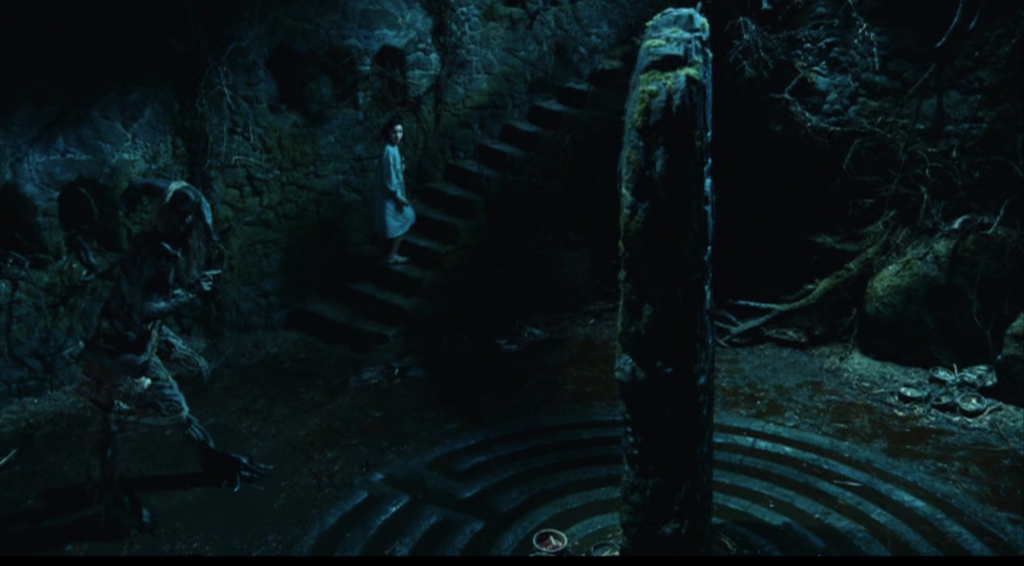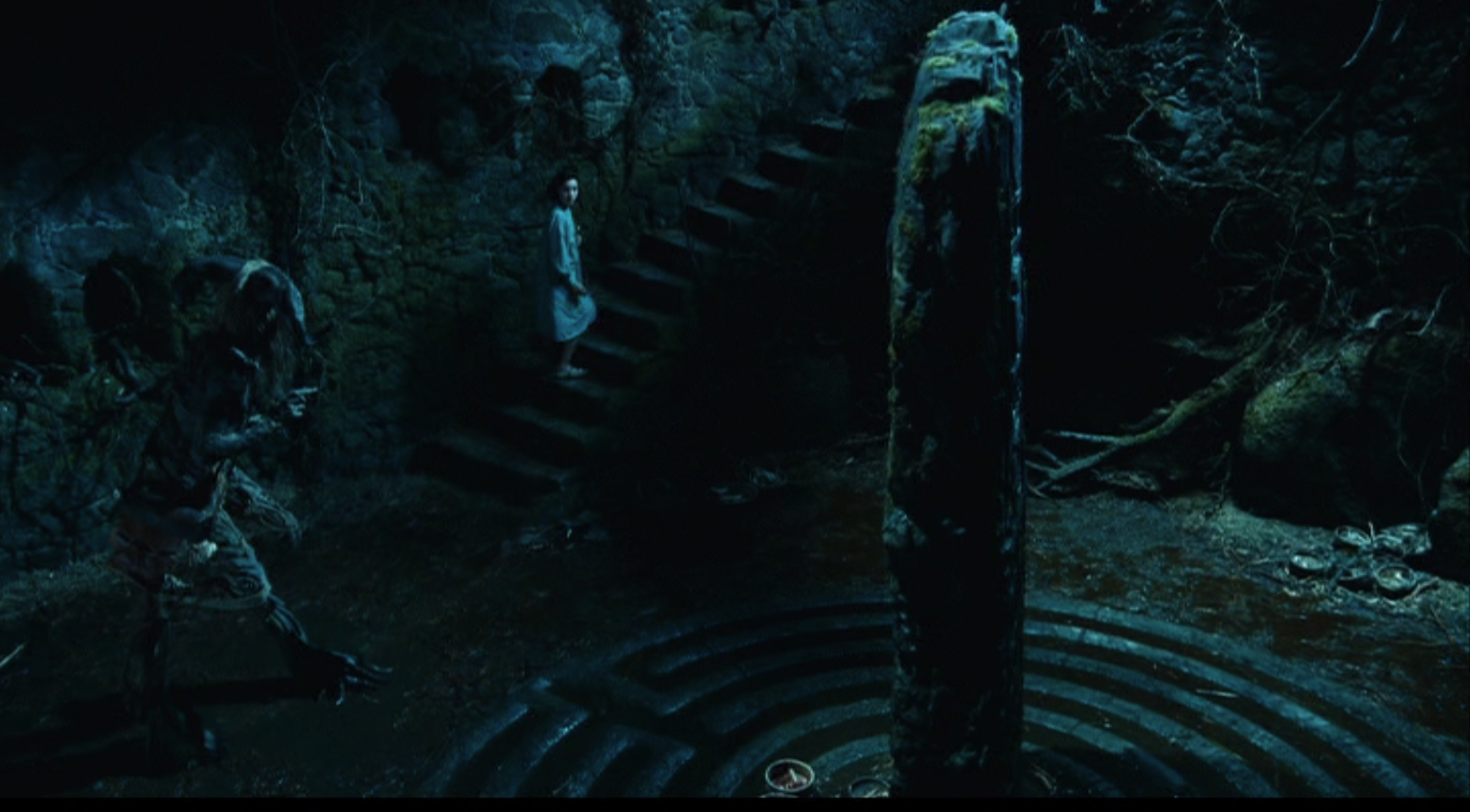Movie Review: Pan’s Labyrinth (2006) directed by Guillermo del Toro (aka “El Labarinto del Fauno”}
It is 1944, and elsewhere in Europe, the Allied troops recently landed in France on D-Day. But here in a remote mountainous region of Spain, Captain Vidal (Sergi López) and his men are hunting down the remnants of the Republicans who lost the Spanish Civil War. Vidal’s wife Carmen (Ariadna Gil) is pregnant with their child, and the captain has ordered that sha and his stepdaughter Ofelia (Ivana Baquero) be brought to the villa that is his base of operations. Ofelia is not pleased to be in the proximity of her stepfather, but is enchanted by the forest, and the nearby pre-Christian stone labyrinth.

Ofelia is a bookish lass, who is fond of fairy tales. And it seems that fairies are fond of her, as one leads her to an underground chamber at the heart of the labyrinth. There Ofelia meets the Faun (Doug Jones), a magical creature that informs Ofelia that she is the reincarnation of the lost Underworld princess Moanna, and can retake her rightful place if she completes three tasks before the full moon.
This sounds like an excellent idea to Ofelia as Francoist Spain is no place she wants to live. But she has to balance this with her concern for her increasingly frail mother, whose pregnancy is life-threatening. Plus Captain Vidal is an ever-present threat, despite the attempts of housekeeper (and secret Republican) Mercedes (Maribel Verdú) to soften their discomfort. And who said the Faun has Ofelia’s best interests in mind in the first place?
This dark fantasy film is deliberately ambiguous about just how real the magic is. No adult sees the magical creatures move or special effects. It could all be in Ofelia’s imagination. This does, however, leave a couple of holes in the plot where certain events have to be shrugged away.
Doug Jones is excellent as both the Faun and the even scarier Pale Man that Ofelia encounters during one of her tasks.
Despite being “neutral” in World War Two and an ally of the United States during the Cold War against the Communists, the fascist-like Falangist government of Generalissimo Francisco Franco was never a favorite of Americans, who sympathized more with the doomed Republicans. Especially as several American writers had served with the Abraham Lincoln Brigade or other anti-fascist units during the Spanish Civil War. I honestly can’t think of a single pro-Franco book or movie I’ve seen. And indeed, after his death and eventual reforms, most of the movies about the time period from Spain itself seem to have been anti-Franco as well.
And so we have Captain Vidal, who is big on obedience, order and purity. He has no respect for women outside their roles as producers of sons, and servants. He thinks of himself as reasonable and just, but easily gives in to temper and cruelty. Captain Vidal feasts with officials while planning to restrict rations for the villagers to prevent them from giving spare food and supplies to the Resistance. (Compare this to the Pale Man, whose table is loaded with delicious-looking food that he will not eat himself, but if you so much as taste one of his grapes, he will kill you.) While he doesn’t frame it in those terms, Falangists tended to be aligned with ultra-conservative Catholicism (and the one priest we see is a collaborator with him) so it’s not surprising that he is disgusted by Ofelia’s left-handedness and what appears to be a pagan ritual.
Carmen means well by her daughter, but has allowed her loneliness and the dangers of being a lone woman in Franco’s Spain push her into a bad marriage. Her own childhood was poverty-stricken, and Carmen has long since abandoned any belief in magic. She thinks Ofelia is a bit too old for fairy tales but doesn’t actually stop her daughter from reading them.
Mercedes is in a difficult spot. Her position as head servant in the villa makes her invaluable to the Resistance, but also means she must serve a man she despises and if discovered, her life will be forfeit. She seems to believe that Ofelia believes she saw a faun, but passes on a warning from her own mother that fauns are dangerous. It’s heartening when Mercedes is able to get a little of her own back on Captain Vidal towards the end because he really is blinded by his sexism.
Ofelia herself is a pretty standard fairy tale protagonist, an innocent child in a bad situation who must complete tasks to unlock her true status (unless of course it’s all in her imagination) and who must learn when obedience or disobedience is the correct action. (Repeatedly in the film, disobedience is the correct moral choice, even though it leads to doom.)
The special effects are practical, rather than digital as was becoming increasingly popular at the time, because at that point, it was less expensive and the budget had to be squeezed somewhere.
Content note: Brutal violence, blood and death, including “animals” and children. Torture. Foul language (in Spanish.) Carmen’s pregnancy is killing her. Despite the protagonist being a child, this is not a movie for children or more sensitive viewers.
In the end, because this is set in history, we know that the bad guys win, at least for a long time. Only the traces of hope remain. But this is a beautifully shot film, so if you like your fantasy sad, this is a movie for you.

